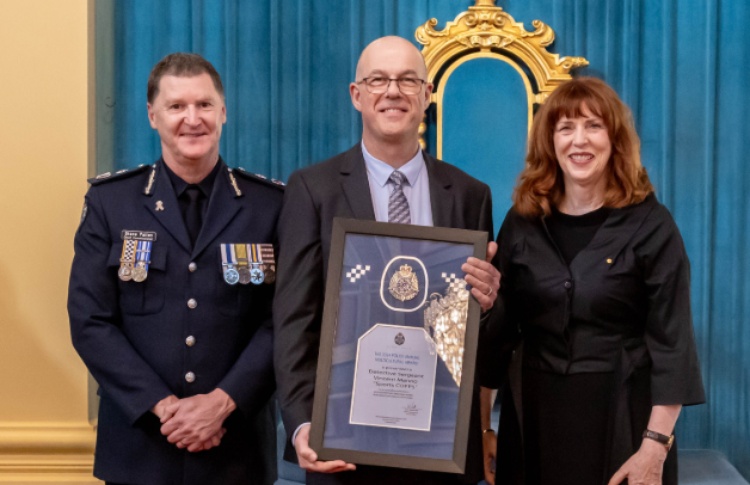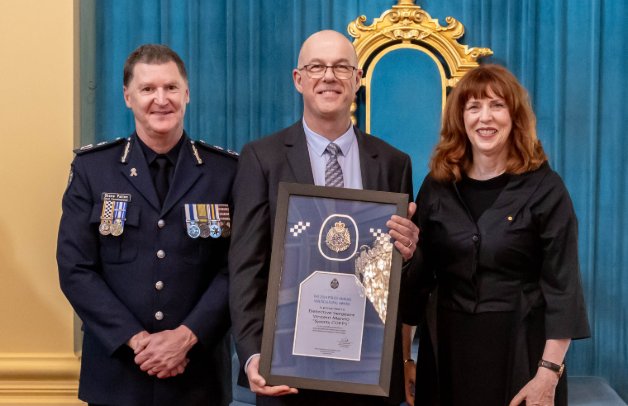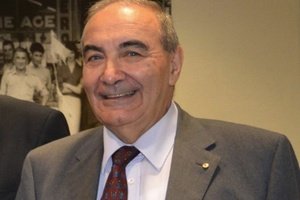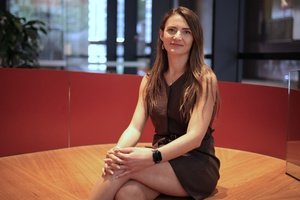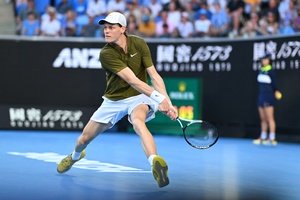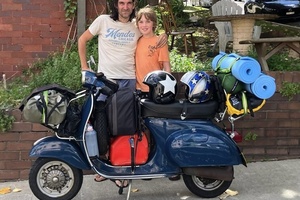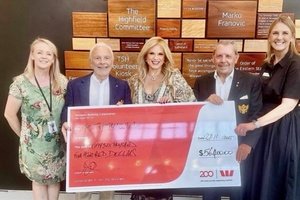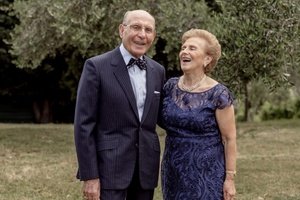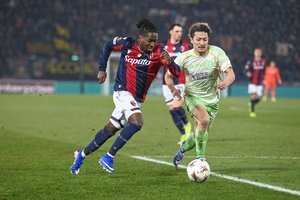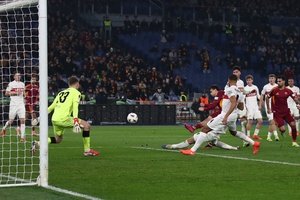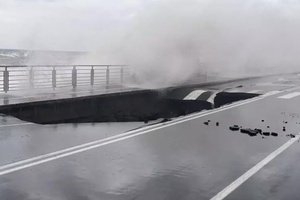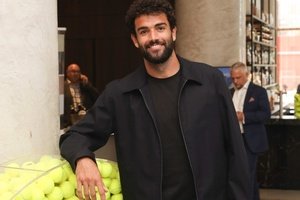Since 2001, he has engaged around 15,000 young people across metropolitan Melbourne and regional Victoria in the Sports COPPS Program: Choices, Opportunities, Partnerships, Participation equals Success.
The inspiring initiative was recognised last week at the Victorian Multicultural Awards for Excellence 2024.
There, Manno received the honour from the Governor of Victoria, Margaret Gardner, and Chief Commissioner Shane Patton, in the presence of Premier Jacinta Allan and various state ministers.
The award honoured his efforts to reduce youth crime, build trust between police and multicultural communities, ease long-standing social tensions and establish partnerships with community groups, schools and sporting clubs.
I met Manno in the elegant Italianate ballroom of Government House. Its distinctive blue walls were glowing in the sunlight that beamed through tall windows on a bright Melbourne afternoon.
“I’m very honoured and very humbled to receive this award,” he says, shaking my hand. He introduces me to his longtime friend, Emmanuel ‘Manny’ Spiteri - who nominated him for the award - and his smiling children, Patrick and Julia.
“My late mother said, ‘Don’t ever forget where you come from … and maintain that connection to your community’,” he shares, his voice tinged with nostalgia.
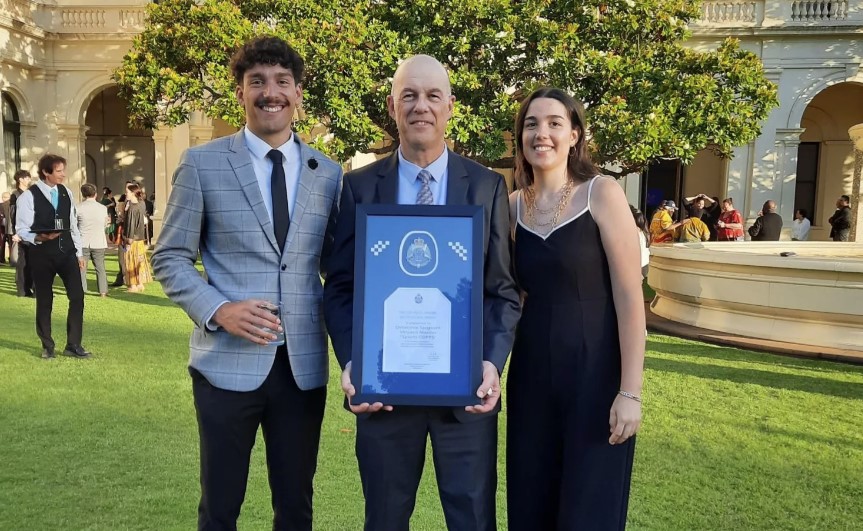
Manno with his children, Patrick and Julia, after the official ceremony at Government House
“She was a teacher’s aide at school, helping mostly multicultural and Italian kids learn English.
“I’ve always said that sport is often replicated in life in the sense that you must work with all types of people, but you must also work with their strengths and weaknesses.
“[Sports COPPS] is run in a voluntary capacity. It’s also an opportunity … to come out and participate with young people and break down any perceived social barriers that there may be.”
Born to a Tuscan father and a Calabrian mother - his father from Lucca, his mother from Stefanaconi in the province of Vibo Valentia - Manno credits his passion for community-building to his love of football.
“For me, soccer, or as it was known, calcio, is the sport I grew up with,” he explains.
“Originally Sports COPPS was Soccer COPPS, but I had a rethink about the program and I thought it was important to include all sports.”
The program targets students from Grade 3 to Year 10, elevating sport as a universal language that transcends political and religious barriers to find common ground.
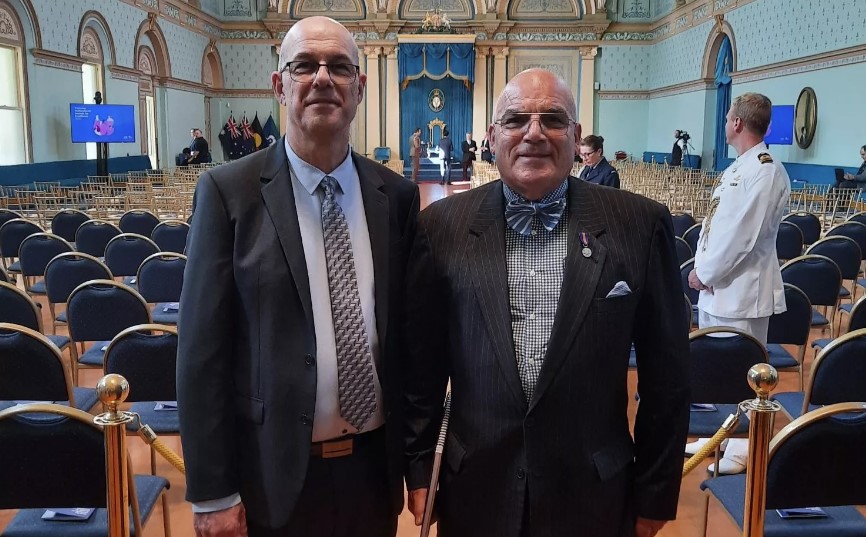
Manno and the friend who nominated him for the award, Emmanuel ‘Manny’ Spiteri
“It’s about helping young people understand what the police do, how they can help the police, how we can help them if they find themselves in trouble, what to do and who to tell,” Manno says.
“If they know about something wrong or they’ve seen something wrong, what we’re asking the young people to do is not so much to intervene, but to tell a responsible adult.
“Of course, if it’s urgent and they have a phone with them [we tell them] to not only ring 000, but then to tell the phone operator who they are, where they are, what’s going on and to stay there to meet the police so they can provide further details.
“The other part I talk to them is about bullying, because that’s inherent in our society whether you’re a sports person, in the work environment or whether you’re at school,” he says.
“I remind them that there’s laws that govern bullying. Also, I talk to them about social media and some of the pitfalls associated with that because they’re vulnerable and they may not understand the repercussions of things they put on social media.
“One of the questions I ask them is, ‘How long do you think items or photographs or videos are on social media for and who owns that?’
“The simple answer to that is: it’s there forever. And who owns it? The social media companies.
“[People] no longer have control over images, videos or other information they put on the internet.”
For Manno, intervention is possible before it’s too late. “We also have an opportunity to connect [kids] to right intervention, early intervention and preventative measures,” he shares.
“In the mid-90s, there were quite a few African youth involved in robberies, and the criminal justice system was a revolving door.
“They were coming out sooner than they were being charged. Not much different to what it is today, but it also appears a lot worse today because they’re not only involved in street robberies, but they’re also involved in aggravated burglaries and stealing cars and serious crimes.
“My scope back then was to try and get involved with youth and again, to try and find common ground with them.
“[Try] to find that level playing field and to try and get them involved in something that the police had a mutual interest in. Sport has always been that mutual interest.
“But once you have that mutual interest, it can lead to different discussions of what’s bothering them, what problems they have.”
Manno grew up in a Melbourne different from the Melbourne of today, a city he recalls where newcomers were burdened by “division and being ostracised”.
“There was a lot of prejudice against [new] people. But ultimately, dad said that we came for the work and not for anything else,” he says.
“I remember him saying many times that we are the true Italians. And I said to him years later, ‘What do you mean by that?’
“He said the Italians of today would not have made the sacrifices that we made in 1956.
“The Italians these days carry on like there was never a world war. There was poverty and there was misery. There was death. He remembered those [things] because it’s important to appreciate what you have today.”
Manno’s father arrived in Melbourne in 1956, during the city’s Olympic year, to reunite with his brother Carmelo. Within a week, he enrolled in a vocational school to become a boilermaker, continuing the trade he started in Italy. He also took English classes to integrate quickly.
Yet, he never abandoned his Italian roots, co-founding Club Italia in Sunshine with other migrants. Manno’s mother, who arrived in Australia at age eight with her family, nurtured a love for gardening and family gatherings.
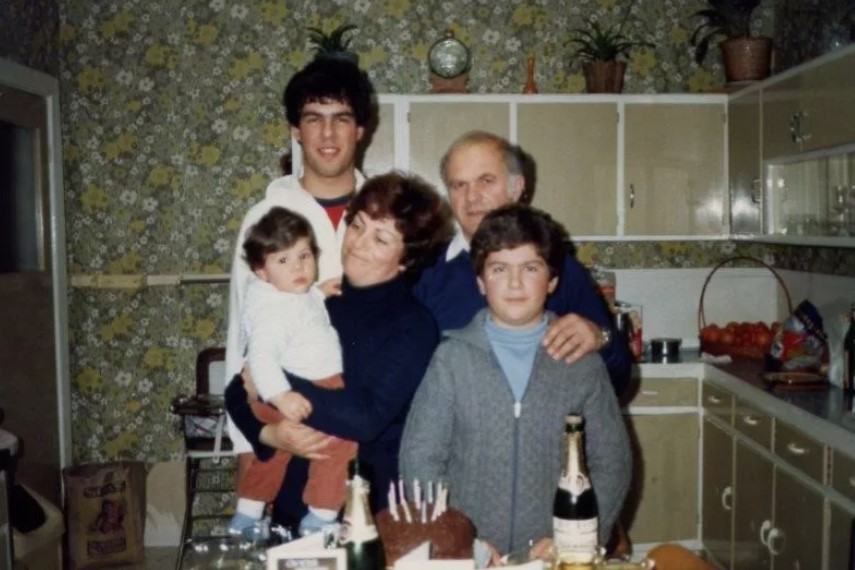
A young Manno (back left) with his parents Pietro and Maria, his sister Amanda in his mother’s arms and his brother Fabian
“Mum used to love the garden. And we had plenty of fruit trees for that reason. We were very self-sufficient, but we also had a big extended family,” Manno recalls, visibly moved.
“My father made sparkling wine at home, using a press he built himself. Sundays were for church and family, as were annual celebrations.”
When Manno chose a career in policing, his father advised him to be cautious and do his best.
“Dad wanted me to get a good education and get a good job. What that job was, was up to me,” Manno explains.
“When I told him that I was looking to go into the police force, he was a bit cautious at first, but then he was supportive and said, ‘Whatever you want to do, you can do, but obviously you want to try and do your best in your chosen career.’
“And although there was maybe some initial hesitation, [my parents] were ultimately very supportive of my chosen career.”
Though his mother passed away at just 43, Manno believes her influence shaped his path. His dedication to justice and the community remains unwavering, reflecting his belief that programs like Sports COPPS can change lives.
“How can we make the State of Victoria a safer place to live in?” Manno asks.
“I think the answer’s a lot more complicated, but I think we’re moving in the right direction.
“There’s a lot of disenfranchised and lost youth, whether multicultural or indigenous or from lower socioeconomic areas that require assistance and help because there’s a lack of support mechanisms.”
For questions or to donate to Sports COPPS, contact Detective Sergeant Vincent Manno at vincent.manno@police.vic.gov.au.

